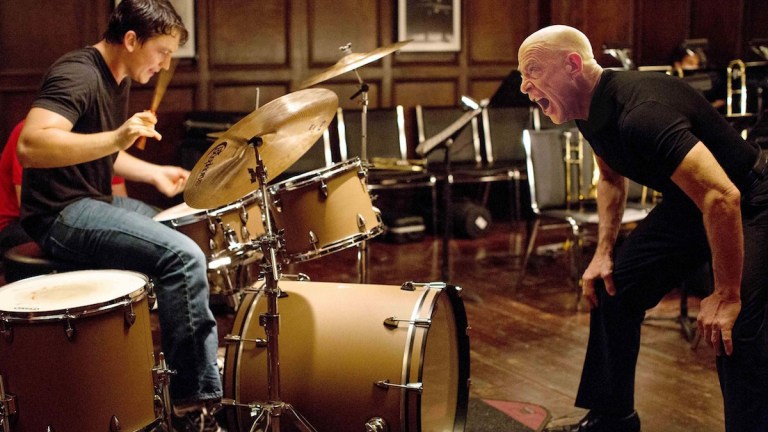Whiplash Review
Whiplash has flown under the radar at NYFF, but it might be the year's best movie, and J.K. Simmons is a lock for Best Supporting Actor.

While the 52nd annual New York Film Festival has become the talk of the industry with its two massive premiere films, Gone Girl and Inherent Vice, it may be festival favorite Whiplash that overshadows the big boys with its intense core of fevered, yet dark exuberance from writer/director Damien Chazelle.
Andrew Neyman (Miles Teller) is an enthusiastic jazz drummer and first-year student at the prestigious Schaefer Conservatory in New York City. He’s focused, determined, and a little too indebted to his life’s love: staying up late into every night, practicing his chops and hoping to one day get the chance to impress Terence Fletcher (played with unapologetic ferocity by J.K. Simmons). Fletcher is the almost mythical and entirely tyrannical head of the school’s Studio Band: the upper-echelon in the world of educational Jazz programs. When the dream of young Andrew’s lifetime comes to fruition, he finds himself in a game of cat and mouse that pushes his physical boundaries and threatens to tear away the few relationships he has left, poking holes in his already fragile mental state.
When the full-length feature first premiered (a short was made first to drum up interest and investors), comparisons were made to Darren Aronofsky’s Black Swan. While both films do explore the trials and tribulations that people will put themselves through to fully realize their hopes and dreams, Whiplash has a more grounded and realistic aura about it. Does everything about the story feel like it could possibly happen in real life? Not really, as the film progresses and Andrew’s world blows up, there tends to be some room for inexplicable circumstances, but the film never reaches into complete absurdity, keeping its audience attached at the hip to the mind boggling horror Andrew (and others) subject themselves to when at the cracked whip of the dictator of jazz.
The story is semi-autobiographical of Chazelle’s single year of fear while under the thumb of his destructive, overpowering jazz teacher in his high school band. The experience made him quit and he moved on to other things, but it’s not just Whiplash that proved he’s still affected by the entire fiasco. Chazelle also wrote the 2013 indie film Grand Piano, which features Elijah Wood as a concert pianist terrified of his big return to the stage where he must play one of the most impossible compositions of music. Chazelle’s first film, meanwhile, Guy and Madeline on a Park Bench, and his upcoming feature, La La Land, also revolve around jazz musicians. This knowledge almost makes me feel slightly uncomfortable for liking Whiplash. What if Chazelle did not have his previous life experience? We don’t know where he would have landed, but it’s strange to know that his pain brought me happiness in the form of a great film.
Though, for all the blood, sweat, and tears that Chazelle suffered painfully from his past, and joyfully from making this film, Whiplash is punctuated and driven by its lead performances. With no shame, I’ll admit to not really liking Miles Teller until now. The few times I can remember seeing him in a film, he was pretty much the same cheeky, sarcastic character in my head.
But throughout Whiplash, he balances on a line of sheepish insecurity and determined passion. You fear for him across every frame, not matter which state of mind he inhabits. A rock drummer himself, Teller suffering behind the kit brims with power and realism. This performance makes me excited for what Teller may produce in the future, and coming from me, that is a huge seal of approval.
All of that said, J.K. Simmons still steals the entire movie and is only once outshined by the Teller’s manic finale performance. Simmons is someone who came to prominence for most as the Nazi monster Vern Schillinger in HBO’s Oz. Since then though, he’s dominated in performances of loving family members or over the top caricatures. He’s fantastic at everything he touches, but it has been while since he’s had such a commanding role, and he simply kills it. Much like Teller, Simmons also plays two sides of one coin seamlessly. If I didn’t know any better, I’d believe anyone who told me Simmons is a split personality sociopath in real life. Chazelle chose to go with a lot of close-ups in the film, and the defined lines and animation of Simmons’ face just piles onto the power and disgust of the character’s vile nature. If nothing else from this film gets honored come the awards season, Simmons has to be a lock for Best Supporting Actor.
Whiplash also really benefits from its fast pace. The film certainly spends time focusing on Andrew’s life outside of the conservatory with glimpses at his relationship with his father and the budding opportunity of a new (if not maybe first) girlfriend. All of these story aspects are resolved without spending an over-abundant amount of time with trivial cutaways to stack the story with more firepower when things start to deteriorate. The film easily captures the audience’s attention from the start and never truly lets go. Too many films sabotage themselves by beefing up an unnecessary runtime with unneeded exposition; Whiplash does the exact opposite.
Enthralling is truly the single world that punctuates what Whiplash is all about. It’s not perfect; I did question my own being sometimes when I found myself about to laugh at the most atrocious bigotry spouted out of Fletcher’s mouth, but that overall feeling of being trapped by the film’s brilliant performances and encapsulating fervor helped wash that all away. We still have to see some of the big films at NYFF this year, but there is a clear chance that Whiplash is one of, it not the best film to be offered up on the schedule.
Like us on Facebook and follow us on Twitter for all news updates related to the world of geek. And Google+, if that’s your thing!
